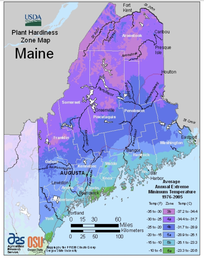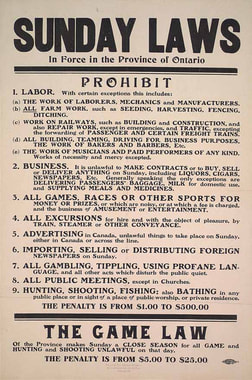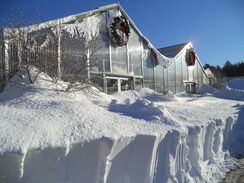|
By Dr. Roger Erdvig, WCS Headmaster  To grow sturdy, deep-rooted plants, plant them close to the equator. Equatorial tropical zones are fertile and well-watered, and they benefit from year-round warmth—such locations are perfect for growing healthy plants. Even though I love northern Maine for its beauty and its offerings of countless outdoor adventures, it doesn’t compare to a tropical zone for growing plants. One look at the plant hardiness map for Maine tells the novice planter that it’s not the ideal place for gardening. This has become a helpful metaphor for me as I think about our most precious “plantings”—our kids. The environment in which we raise them is critical to their growth and development.  At the risk of oversimplifying things, I want to make some metaphorical connections between the kinds of environments that are conducive to cultivating plants and those that are conducive to cultivating our kids. And here’s the spoiler alert--we don’t live in a cultural rainforest, so we need to be creating greenhouses in northern Maine. There was a time in the history of western culture in general, and in American culture in particular, when our society was generally structured around principles that were conducive to the development of a strong Biblical worldview in our kids. One simple example would be in the blue laws that were once common in the States. Up until the mid to late 1900s, “blue laws” required most businesses to be closed on Sundays, or they were very limited in what they could sell. I can still remember as a kid in the 1970s driving home from church on Sunday afternoons seeing just about every store with a “CLOSED” sign dangling in the front widow. Athletic fields were empty, and other options for going out and doing things were pretty much limited to visiting family and heading back to church in the evening. While I’m not going to debate whether a Christian can buy or sell on a Sunday or whether churches should re-institute Sunday night service, it is clear that our society was structured (at least in this instance) in such a way as to make following one of God’s commands easier for families. In the Ten Commandments, we see that taking one day and setting it apart from work for worship is fundamental to God’s good law for humans. The Sunday blue laws certainly didn’t make anyone a Christian, but when the options for doing stuff on Sundays were limited, it was easier for families to obey the commandment to “Remember the Sabbath and keep it holy.” Today, Sunday has become “Saturday - Part II,” and most families continue their frenetic pace of living right through to Sunday night when they crash into bed without having had a sliver of spiritual reflection or rest—let alone significant time with the Lord—from one week to the next. This simple example serves to demonstrate how our society has subtly shifted from being ordered in ways that generally favored developing a Biblical worldview to a society that is now aggressively working against that ideal. There are many other examples of this shift, from the content in movies, music, and TV to the health industry’s unbridled promotion of gender reassignment therapies. Many of today’s cultural norms and values simply do not support the development of a Biblical worldview. They work against it.  Here's where I want to explore the metaphor of a tropical zone versus northern Maine. Too often we as parents naively act as if we live in a cultural climate that is conducive to developing a Biblical worldview in our kids. Too often we uncritically accept the values and norms that society has to offer our children, allowing them to consume whatever culture serves up. In reality, the climate is like a northern Maine winter, where the temperature, winds, and snowfall make growing plants impossible for most of the year. The only way to grow sturdy plants there is to do so in a greenhouse, where the environment inside can be engineered to promote growth no matter what’s going on outside. This is what we as Christian families need to be doing—creating counter-cultural, Biblical worldview-immersed climates in our homes, churches, and schools. We are no longer living near the equator but instead must build greenhouses in northern Maine. This will take a good deal of effort and intentionality on our part.  It means limiting our children’s activities to promote rest, reflection, and life-giving relationships. Filling their imaginations with what is true, good, beautiful, and right. Leading them to a lifestyle of submission to Christ through our decisions to make great sacrifices for His Kingdom. These are just a few examples of the kinds of choices Christian parents need to make. The climate outside is working in direct opposition to these things, encouraging our children to be chaotically busy, to fill their imaginations with what is opposed to Godliness, and to focus on self-preservation. I’ve been to Longwood Gardens several times in the dead of winter when the wind chill is cruelly penetrating and walking among the outside displays is not advisable. However, in the Conservatory, plants are still growing and guests can enjoy the lush beauty that has been carefully cultivated in the warm and inviting environment. Our children need us to create the same kinds of environments where they can grow and flourish in the midst of what Paul calls a “wicked and crooked generation.” We’re not in the rainforest anymore. It’s time to build some greenhouses in northern Maine. Comments are closed.
|
Cultivating godly influencersWilmington Christian School provides a distinctively Christian, innovative education that effectively develops Godly influencers who are well prepared for life after high school and who impact the culture for Christ. Archives
May 2024
Categories
All
|
|
Wilmington Christian School provides a distinctively Christian, innovative education that effectively develops Godly influencers who are well prepared for life after high school and who impact the culture for Christ.
Wilmington Christian School admits students of any race, color, national and ethnic origin to all the rights, privileges, programs, and activities generally accorded or made available to students at the school. It does not discriminate on the basis of race, color, national and ethnic origin in administration of its educational policies, admissions policies, scholarship and loan programs, and athletic and other school-administered programs. |
|
|
© Copyright Wilmington Christian School. All Rights Reserved.
Website designed by PROSPER Creative Design
Website designed by PROSPER Creative Design


